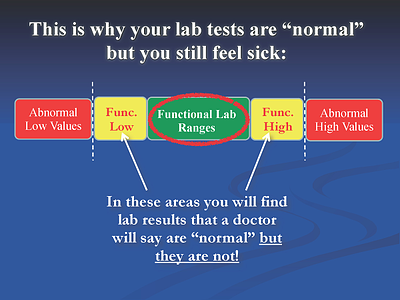This is the everyday struggle a majority of thyroid patients face. They work with doctors who discount their ongoing thyroid symptoms because their lab values are normal.
There are a multitude of mechanisms that are possible in this scenario. I want to explain two of the most common scenarios we come across in our patient population.
1. Functional Ranges - most of the lab ranges you see on your lab reports are based off of bell curve analysis. Basically this means that they take the average value from a sample of patients that had their blood drawn at that lab and call that "normal." The problem is this lab normal doesn't represent physiological normal function.

If you pick up the most recent copy of your thyroid lab report you see that they listed the range for for TSH at about .5 to 5.0.
So what exactly is a functional range then?
A functional range is just a tighter range that is more representative of physiological normal. The functional range for TSH on a blood test is 1.8 to 3.0 according to the Endocrine Society. So if we see a patient with ongoing thyroid symptoms and a TSH of 4.2 ... we know there is still an underlying problem.

Since your doctor is likely interpreting your lab values through "lab ranges", not functional ranges, they will miss subtle clues pointing to a solution to your thyroid symptoms.
2. Under-conversion - your body makes primarily T4, which is the inactive form of thyroid hormone. Our body must then convert the T4 into T3, the active form of the hormone which is responsible for creating the thyroid metabolic response.
I see countless lab reports that only measure TSH and T4. They never even check to see if T4 is properly converting to T3. If you have normal TSH and T4 but abnormal T3 then you are going to have ongoing thyroid symptoms. How would you know if they never even measure it?
So there you have it.
Just two of the many ways patients can have normal thyroid labs and still have thyroid symptoms.
At our clinic we thoroughly investigate these and many other mechanisms that could create the scenario of normal thyroid labs and a dysfunctional thyroid. We don't just do a quick glance at a lab report and tell you "everything looks normal."
If you want to get started with our very personalized and unique approach to dealing with thyroid symptoms Click Here.
Do you want additional helpful thyroid information? Download my Top 8 Lifestyle Tips For Healthy Thyroid Function Click Here.
If you found value in this article, please use the social sharing icons at the top of this post and please share with those you know who are still suffering with low thyroid symptoms despite having medical managment. Thank you, help me reach more people so they may regain their zest for living!



